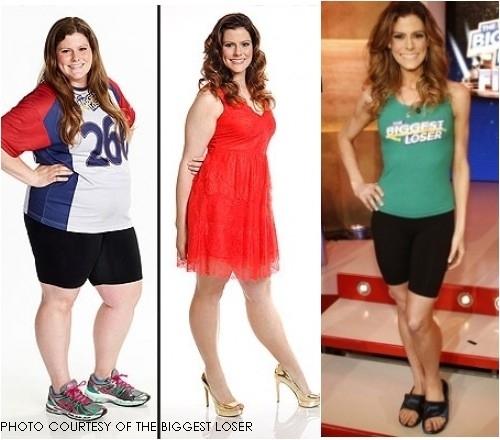
As the final episode of Biggest Loser’s fifteenth season came to a close, I was left feeling exceptionally disappointed in the winner Rachel Frederickson.
She started the season at 260 pounds. She gave up numerous college scholarships and a chance at an Olympic swimming career to move to Europe with her boyfriend. However, when the relationship failed Rachel quickly found herself gaining an extensive amount of weight. A previous contender for the Olympics, Rachel was determined to lose the weight.
Throughout the entire season, Frederickson proved herself as the one to beat. She won most of the in-house competitions with her natural athletic ability, putting a large target on her back early on. Her determination to lose the weight shined clear after the first few weigh-ins and grew passionately throughout the weeks.
With a few months between the second-to-last episode and the finale, the three finalists–Rachel Frederickson, Bobby Saleem, and David Brown–were given the opportunity to lose those last few pounds to gain the title of the Biggest Loser. In the episode before the finale, Rachel was stunning. Maybe ten more pounds and she would have been perfect and healthy.
But when the finale episode aired live on television, Rachel stepped across the stage looking anorexic. That night, the scale revealed her weight to be 105 pounds. She lost a total of 155 pounds with a 59.62% total weight loss. I personally am 5’1” and weigh 110; she is about 5’4” and weighs 105?
What happened to the healthy Rachel I loved throughout the whole season?
At 5’4” the healthy weight is about 120 pounds. Frederickson merely needed to maintain her body weight or shave off about ten pounds for the finale, but her astonishing drive pushed her far over the edge. She became so focused on the end goal-obtaining the title Biggest Loser–that she lost sight of the true goal–being healthy.
The main question floating around the Internet (other than “did she lose too much?”) is: does she deserve to win?
The runner up David Brown started at 409 pounds and ended at 243, losing a shocking 222 pounds with 54% total weight loss. Frederickson may have felt threatened by Brown’s increasing weight loss and so jumped the gun on losing as much weight possible to beat him.
If Rachel had lost enough weight to fit the 5’4” perfect ideal, she would have lost only 46% of her total weight which is 8% lower than David’s 54% weight loss. If she was healthy at the finale she would not have won the competition, would have lost the $250,000 reward, and would not have the title of Biggest Loser.
Thousands of people use the competition as motivation to lose weight and use the contestants as role models in their lives. Overweight children will look up to Rachel and think that is the healthy standard. It’s sending the wrong message.
Many people, including myself, are calling to Biggest Loser to alter the rules. A contestant should be disqualified and not rewarded for losing a great deal more than their ideal weight. The competition is not solely based on trying to gain the title, but is based in contestants finding themselves again and literally stripping away the weight that’s held them down.
The winner should represent more than total percentage of weight loss. They must represent instead a well rounded contestant that not only loses amazing amounts of weight, but also gains self esteem and higher levels of mental health.
Psychology Today mentioned that obesity is mainly due to a person’s mentality (excluding those with diabetes). There is a “strong tendency for both therapists and laypeople to consider obesity a sign of mental illness”.
Weight gain is merely a consequence of diminished mental health. The trainers can easily teach the contestants how to shed the weight, but without lessons of eating healthy and learning to love and forgive yourself, all the workouts and training sessions would go to waste.
David still has a bit more weight to lose, but he undeniably should have won the title as Biggest Loser. He lost his wife at an early age and was tasked with raising his two young daughters alone. His weight escalated and soon his health came into question, causing him to join the show.
Biggest Loser helped him to move past–but not forget–his first wife. He came out of the show completely transformed, back to the man he was for his first wife. He deserved to win, not only because he almost lost the most weight, but also because he gained so much mentally.

Leave a Reply